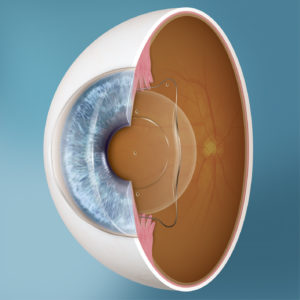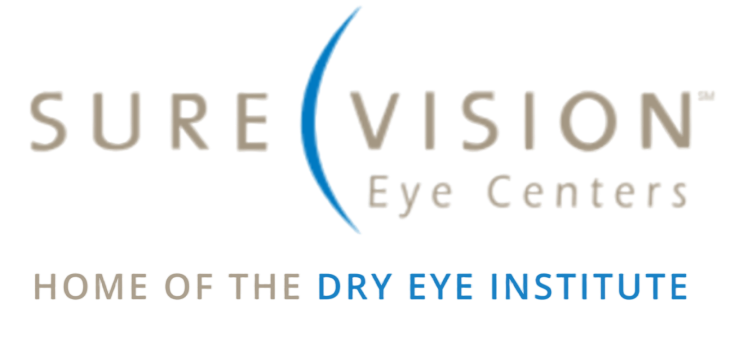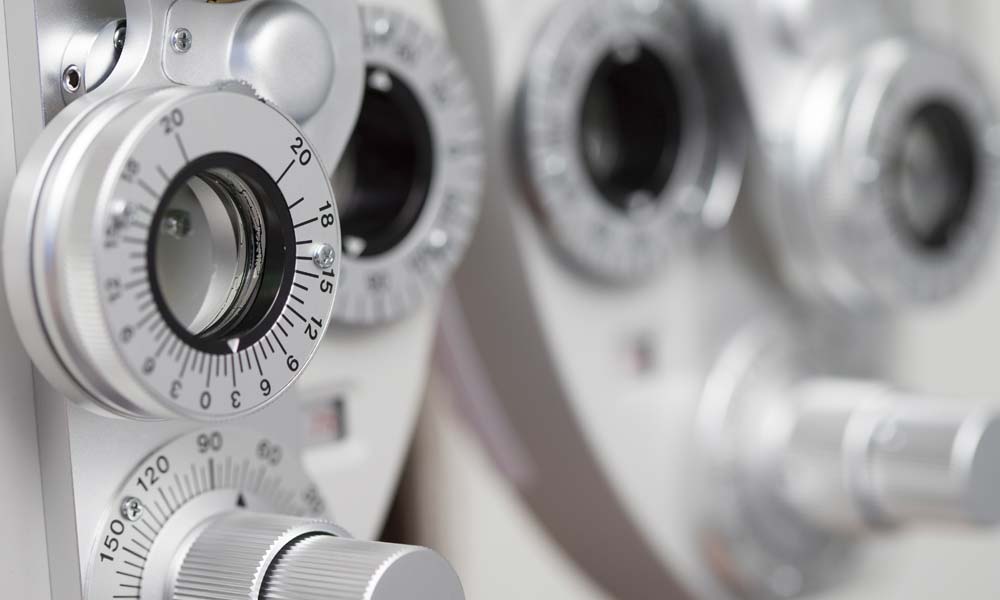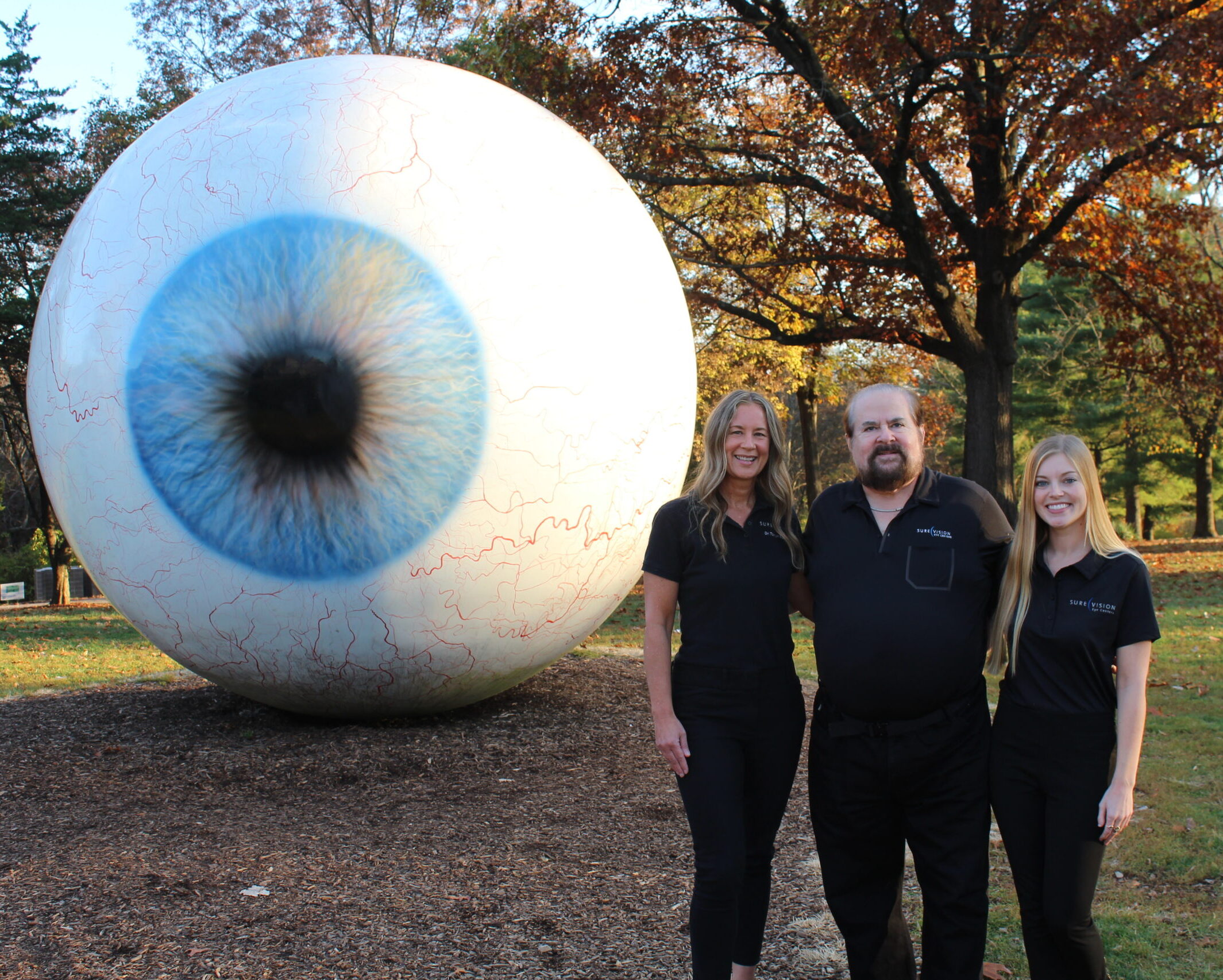Cornea Information
Surgery to reduce/eliminate the need for glasses or contact lenses is called Vision Correction Surgery. Understanding how your eye focuses shows you how surgery can help.
There are two focusing elements in your eye: the cornea and the lens. The cornea is the front clear wall that you see through. The lens is inside your eye and works to adjust your focus like the lens inside a camera. Vision Correction Surgery can improve the focusing power of either of these to reduce or eliminate your need to use glasses or contact lenses.
Frequently Asked Questions About The EVO Visian ICL Lens
What is the EVO Visian ICL Lens?

What are the Benefits of EVO Visian ICL?
EVO Visian ICL offers many benefits for patients who are candidates for the ICL procedure and are seeking a vision solution that allows them the freedom of less dependence on glasses or contact lenses. The advantages of EVO Visian ICL include:
- Sharp, clear vision[1]
- Excellent night vision[2]
- Does not cause dry eye syndrome[3]
- Quick procedure and recovery
- No removal of corneal tissue
- Removable by your doctor
- Protection from UV rays
[1] Igarashi A, Kamiya K, Shimizu K, Komatsu M. Visual Performance after implantable Collamer lens implantation and wavefront-guided laser in situ keratomileusis for high myopia. Am J Opthalmol. 2009
[2] Martinez-Plazs E, Lopez-Miguel A, Lopez-De La Rosa A, et al. Effect of the EVO+ Visian Phakic Implantable Collamer Lens on Visual Performance and Quality of Vision and Life, Am J Ophthalmol 2021;226: 117–125
[3] Ganesh S, Brar S, Pawar A. Matched population comparison of visual outcomes and patient satisfaction between 3 modalities for the correction of low to moderate myopic astigmatism. Clin Ophthalmol. 2017 Jul 3;11:1253-1263.
Who is a Candidate for Vision Correction with EVO Visian ICL?
People who want a flexible and biocompatible vision correction option, as well as many patients who are not candidates for laser vision correction, find that Visian EVO ICL is the right procedure for them.
Ideal candidates for EVO Visian ICL:
- Are between the ages of 21 and 45
- Are seeking a vision correction solution for moderate to severe nearsightedness (with or without astigmatism)
- Have a stable prescription that has not changed within the last year
- Have good ocular health with no history of glaucoma, iritis, or diabetic eye disease
How is the EVO Visian ICL Lens Procedure Performed?
Vision correction with the EVO Visian ICL is an outpatient procedure that typically takes 20 to 30 minutes. After an initial exam with your ophthalmologist to determine that the EVO ICL is right for you, you will schedule your procedure. On the day of the procedure, your eyes will be numbed with an anesthetic eye drop and your refractive surgeon will implant the ICL between the iris (colored part of the eye) and the natural lens. Your surgeon will likely schedule a follow-up appointment the same day as the procedure.
Can the EVO Visian ICL Lens be Removed?
Yes; the EVO Visian ICL is intended to provide permanent vision correction, but it can be removed or upgraded by your surgeon.
Will I be able to feel the EVO Visian ICL Lens?
No, patients should not feel the lens as it does not adhere to any structures within the eye and does not move once in place.
Will other people be able to see the EVO Visian ICL Lens?
No, the Visian EVO lens is placed behind your iris where only your eye doctor will be able to detect it.
Are there any risks with the EVO Visian ICL Procedure?
Any medical procedure has certain risks associated with it. Potential complications of the EVO ICL procedure, although rare, include inflammation, an increase in eye pressure, or the need for an additional procedure, like an ICL exchange. While these potential risks are mitigated as much as possible, they can all typically be addressed early and without long-term side effects.
Important Safety Information
The EVO Visian ICL lens is intended to correct/reduce nearsightedness between -3.0 D up to -20.0 D and treat astigmatism from 1.0 D to 4.0 D. If you have nearsightedness within these ranges, EVO Visian ICL surgery may improve your distance vision without eyeglasses or contact lenses. Because the EVO Visian ICL corrects for distance vision, it does not eliminate the need for reading glasses, you may require them at some point, even if you have never worn them before. Since implantation of the EVO Visian ICL is a surgical procedure, before considering EVO Visian ICL surgery you should have a complete eye examination and talk with your eye care professional about EVO Visian ICL surgery, especially the potential benefits, risks, and complications. You should discuss the time needed for healing after surgery. Complications, although rare, may include need for additional surgical procedures, inflammation, loss of cells from the back surface of the cornea, increase in eye pressure, and cataracts. You should NOT have EVO Visian ICL surgery if your doctor determines that 1) the shape of your eye is not appropriate, 2) you do not meet the minimum endothelial cell density for your age at the time of implantation, 3) you have moderate to severe glaucoma, 4) your vision is not stable; or 5) if you are pregnant or nursing.
For additional information with potential benefits, risks and complications please visit DiscoverICL.com
Correcting the Lens
The other focusing element of your eye is the lens. This is located inside the front of your eye, behind the cornea. The lens is suspended by fibers attached to a muscle that can squeeze it, or stretch it, to change the focusing power of your eye. If this does not focus your eye properly it can produce the Dysfunctional Lens Syndrome. If your lens gets cloudy with age of disease, it is called a Cataract. Cataract treatment, such as Refractive Lens Surgery, can correct these problems and works in two ways. One way is to add an additional lens that works with your natural lens to give you more focusing power. This is called an ICL (implanted contact lens) or Phakic Lens Implant. This adds extra focusing strength to your eye and preserves your natural ability to change focus for distance and reading. It is particularly helpful in people with too much nearsightedness or too thin a cornea for laser refractive surgery.
The second way is to remove your natural lens and replace it with an artificial lens (Lens Implant) that can put your eye into focus. This is certainly how we fix cataract problems, but can also be done for the Dysfunctional Lens Syndrome. Since the lens implant is artificial, we can use whatever lens is available to give you good focus. These come in a wide range that can correct nearsightedness, farsightedness, and astigmatism. They also come in a style that can give you range of focus for both near, far, and inbetween vision.
Years of Experience
At SureVision Eye Centers, our lens surgery specialists have decades of experience performing these procedures, and we offer the most sophisticated instruments to accurately measure and evaluate your eyes for refractive lens surgery. Your first step is to visit our ophthalmologists for an evaluation to find out if this is right for your eyes.
At SureVision Eye Centers,
Vision Like You’ve Never Seen Before™
The surgeons and doctors at SureVision Eye Centers are among the most experienced and well-trained in the world. Each year, they perform thousands of surgical and vision correction procedures. At SureVision Eye Centers, we believe everyone should have a lifetime of their best possible vision.


